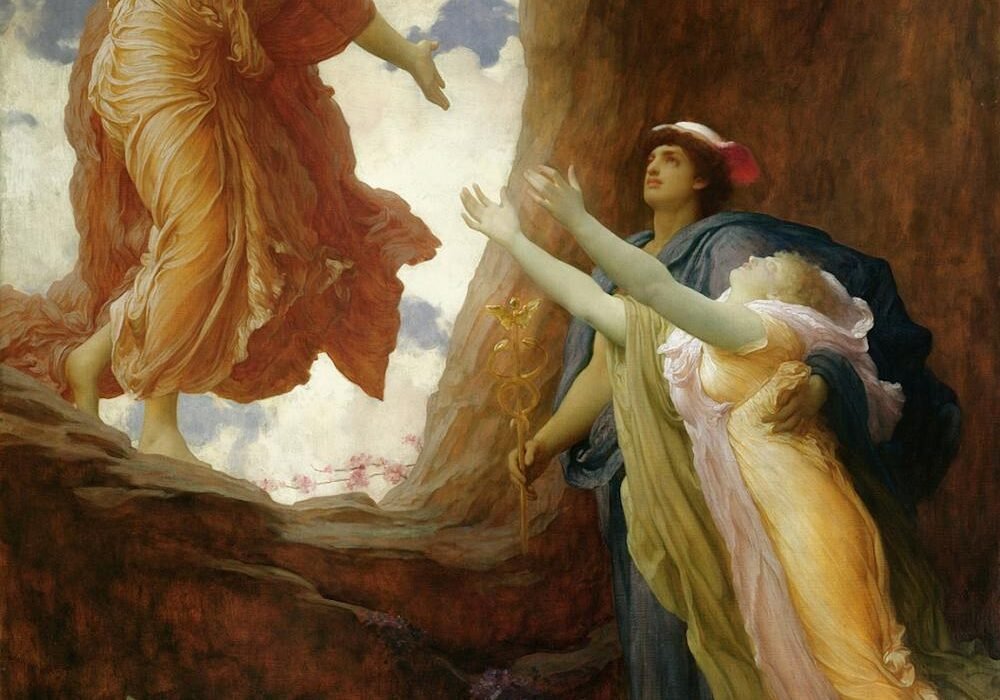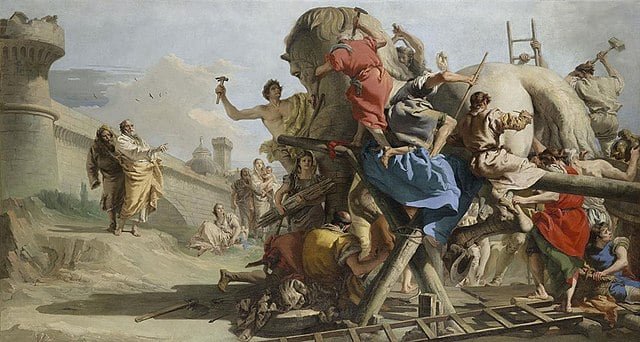Long before Zeus lifted his thunderbolt, long before Hera wore her crown, long before Apollo’s lyre sang beneath the sun, there were others. They were not kings or queens in the sense we know today, but primordial powers—beings of immense strength and terrifying presence. These were the Titans, the rulers before the Olympians, born from the very bones of the cosmos, shaped in the earliest breaths of creation. Their names echo through the corridors of mythology like the rumble of distant thunder: Cronus, Rhea, Oceanus, Hyperion, Mnemosyne.
To speak of the Titans is to step back into a world before human order, before divine justice, into an age when raw power reigned. They were not gods of balance and harmony, but forces of primal authority. The Olympians, those gods we so often celebrate in myths, were not the first to hold dominion. They were successors, rebels who dethroned their predecessors in an epic struggle that defined the very fabric of Greek mythology.
The Titans, then, are more than characters in myth. They are symbols of an older order, reminders that every new age is built upon the ruins of one that came before. Their story is one of birth, betrayal, war, and exile. It is a tale that shapes the cosmos, a saga of family divided against itself, of power claimed and power lost.
The Birth of the Titans from Chaos
Greek mythology begins not with the Titans but with the primordial deities, beings who personified the raw materials of existence itself. At first there was Chaos, the gaping void. From Chaos came Gaia (Earth), Tartarus (the abyss), Nyx (Night), and Eros (Love). Gaia, the great mother, gave birth to the sky, Uranus, and together they would bring forth the mighty generation of the Titans.
From the union of Earth and Sky came twelve children: six males and six females. They were Oceanus, Coeus, Crius, Hyperion, Iapetus, Cronus, Theia, Rhea, Themis, Mnemosyne, Phoebe, and Tethys. To them, Uranus and Gaia also gave life to monstrous beings—the one-eyed Cyclopes and the hundred-handed Hecatoncheires.
The Titans embodied vast concepts of existence. Oceanus was the boundless river encircling the world; Hyperion was linked to heavenly light; Mnemosyne was memory itself; Themis stood for divine law; and Cronus, the youngest and most cunning, would one day seize power. They were not yet gods of temples and prayers but cosmic forces, vast presences shaping the order of the universe.
Uranus and the First Rebellion
Though the Titans were mighty, their father Uranus was a tyrant. He despised his monstrous children, the Cyclopes and Hecatoncheires, and imprisoned them deep within Gaia’s womb. In agony, the Earth groaned beneath the weight of her imprisoned offspring, and so she plotted rebellion.
Gaia fashioned a sickle of adamant and urged her children to rise against their father. Fear gripped most of the Titans, but Cronus, ambitious and bold, accepted his mother’s call. One night, as Uranus descended to lie with Gaia, Cronus ambushed him. With the sickle, he castrated his father, casting the blood and severed parts into the sea. From Uranus’ blood sprang the Furies, the Giants, and the ash-tree nymphs, while from the sea foam arose Aphrodite, goddess of love.
With Uranus defeated, Cronus declared himself ruler of the cosmos. The Titans now reigned, ushering in the Golden Age—a time of abundance, when humanity lived without toil, hunger, or sorrow. Yet even in this age of prosperity, shadows of betrayal lingered, for power seized by violence rarely rests in peace.
The Rule of Cronus and the Golden Age
Cronus ruled with his sister Rhea as his queen. Their reign was remembered by later Greeks as a paradise on Earth, a time when crops grew without sowing, and humankind lived free of suffering. The Golden Age was not merely a myth of plenty; it was a memory of innocence, of a time before strife and mortality entered the human condition.
But Cronus himself lived in fear. A prophecy foretold that one of his children would rise against him, just as he had overthrown Uranus. Desperate to prevent this fate, Cronus devoured each of his children at birth: Hestia, Demeter, Hera, Hades, and Poseidon disappeared into his insatiable stomach. Rhea, grieving, turned to Gaia for help.
When her sixth child, Zeus, was born, she hid him away in a cave on Crete, swaddling a stone in place of the infant. Cronus, unsuspecting, swallowed the rock whole. Meanwhile, Zeus grew in secret, nurtured by nymphs, protected by the Curetes who clashed their shields to drown out his cries. The stage was set for the greatest cosmic war mythology had ever known.
The Titanomachy: War of Gods and Titans
When Zeus came of age, he challenged his father. With the help of the goddess Metis, he tricked Cronus into regurgitating his siblings. The Olympians, now free, rallied under Zeus’ leadership. To their side came the Cyclopes, who forged thunderbolts, tridents, and helmets of invisibility, and the Hecatoncheires, whose hundred arms hurled mountains in battle.
For ten years, the Titans and Olympians clashed in the Titanomachy, a war that shook the cosmos. The Titans, led by Cronus, Coeus, Hyperion, and Iapetus, fought from the heights of Mount Othrys, while the Olympians fought from Mount Olympus. The battles raged with unimaginable fury—earthquakes split the land, storms darkened the skies, and the seas boiled with rage.
Ultimately, the Olympians triumphed. The Titans were overpowered, and Zeus cast them into Tartarus, the deep abyss, guarded by the Hecatoncheires. Only a few were spared—Oceanus, who had not fought in the war; Mnemosyne, Themis, and others who were seen as allies or neutral. The Titanomachy ended the rule of the Titans, and the Olympians rose as the new masters of the cosmos.
The Enduring Power of the Titans
Though defeated, the Titans never disappeared from Greek thought. They remained powerful figures, haunting the myths and shaping the world even in exile. Some, like Prometheus and Epimetheus (descendants of Iapetus), played crucial roles in humanity’s fate. Prometheus, in particular, defied Zeus by giving fire to humans, an act of rebellion that echoed the defiance of the Titans themselves.
Others, like Oceanus, continued to embody eternal natural forces. Mnemosyne, goddess of memory, gave birth to the Muses, who inspired poetry, song, and history. Even Rhea, the mother of gods, retained her dignity as a great mother figure in myth and worship.
The Titans, therefore, were never erased. They became shadows, reminders of an older order, lingering powers beneath the dominion of the Olympians.
The Titans as Symbols of Power and Rebellion
The myth of the Titans is not merely a tale of gods and monsters. It is also a reflection of human experience. Every age must overthrow the one before it, just as Cronus overthrew Uranus and Zeus overthrew Cronus. Each generation struggles against its predecessors, creating conflict but also progress.
The Titans symbolize primal authority—vast, untamed forces that must be overcome for civilization to flourish. Yet they also represent memory and origin. The Olympians could not exist without the Titans, just as children cannot exist without parents. The Titanomachy is therefore not just a war but a cycle of renewal, a mythic explanation for the rise and fall of powers in both divine and human realms.
Legacy of the Titans in Culture and Imagination
The word “titan” has never lost its power. In modern language, we still use it to describe someone of immense strength, intellect, or influence. The Titans of myth inspired literature, art, and philosophy. From Hesiod’s Theogony to modern fantasy, their story continues to be retold.
Artists have painted the terrible grandeur of Cronus devouring his children; poets have celebrated Prometheus as a hero of defiance; philosophers have drawn parallels between the Titanomachy and the struggles of humanity against tyranny. The Titans are eternal because they are more than gods—they are archetypes of power, rebellion, memory, and fate.
Conclusion: The Shadows Beneath Olympus
The Titans may have fallen, but their story remains essential to the great tapestry of Greek mythology. They remind us that power is never eternal, that every age rests on the ruins of what came before. They remind us that creation and destruction, order and chaos, are forever intertwined.
The Olympians may reign in glory, but beneath Olympus lies Tartarus, where the Titans wait in the shadows, ancient and undefeated in memory. They are not gone—they are the eternal echo of a truth: before the bright gods of Olympus, there was another age, ruled by giants whose names still rumble like distant thunder.
The Titans are not just myths of the past. They are the embodiment of the eternal cycle of power, rebellion, and renewal. Their story is a mirror in which humanity sees its own struggles, its own rise and fall, and its own search for meaning in the ever-turning wheel of time.






